- Home
- Haruki Murakami
First Person Singular Page 2
First Person Singular Read online
Page 2
On the bench in the arbor, I screwed my eyes tightly shut, bent over, and waited to be freed from that blockage. It may have been five minutes, it may have been fifteen. I don’t know how long. All the while, I watched as strange patterns appeared and vanished in the dark, and I slowly counted them, trying my best to get my breathing back under control. My heart beat out a ragged tempo in my rib cage, as if a terrified mouse were racing about inside.
I’d been focusing so much on counting that it took some time for me to become aware of the presence of another person. It felt as if someone were in front of me, observing me. Cautiously, ever so slowly, I opened my eyes and raised my head a degree. My heart was still thumping.
Without my noticing, an old man had sat down on the bench across from me and was looking straight at me. It isn’t easy for a young man to judge an elderly person’s age. To me, they all just looked like old people. Sixty, seventy—what was the difference? They weren’t young anymore, that was all. The man was thin, of medium height, and was wearing a bluish-gray wool cardigan, brown corduroy pants, and navy-blue sneakers. It looked as though a considerable amount of time had passed since any of these were new. Not that he appeared shabby or anything. His gray hair was thick and stiff looking, and tufts sprung up above his ears like the wings of birds when they bathe. He wasn’t wearing glasses. I didn’t know how long he’d been there, but I had the feeling that he’d been observing me for quite some time.
I was sure he was going to say, “Are you all right?,” or something like that, since I must have looked as if I were having trouble (and I really was). That was the first thing that sprang to mind when I saw the old man. But he didn’t say a thing, didn’t ask anything, just gripped a tightly folded black umbrella that he was holding like a cane. The umbrella had an amber-colored wooden handle and looked sturdy enough to serve as a weapon if need be. I assumed that he lived in the neighborhood, since he had nothing else with him.
I sat there trying to calm my breathing, the old man silently watching. His gaze didn’t waver for an instant. It made me feel uncomfortable—as if I’d wandered into someone’s backyard without permission—and I wanted to get up from the bench and head off to the bus stop as fast as I could. But, for some reason, I couldn’t get to my feet. Time passed, and then suddenly the old man spoke.
“A circle with many centers.”
I looked up at him. Our eyes met. His forehead was extremely broad, his nose pointed. As sharply pointed as a bird’s beak. I couldn’t say a thing, so the old man quietly repeated the words: “A circle with many centers.”
Naturally, I had no clue what he was trying to say. A thought came to me—that this man had been driving the Christian loudspeaker car. Maybe he’d parked nearby and was taking a break? No, that couldn’t be it. His voice was different from the one I’d heard. The loudspeaker voice was a much younger man’s. Or perhaps that had been a recording.
“Circles, did you say?” I reluctantly asked. He was older than me, and politeness dictated that I respond.
“There are several centers—no, sometimes an infinite number—and it’s a circle with no circumference.” The old man frowned as he said this, the wrinkles on his forehead deepening. “Are you able to picture that kind of circle in your mind?”
My mind was still out of commission, but I gave it some thought, just as a courtesy. A circle that has several centers and no circumference. But, think as I might, I couldn’t visualize it.
“I don’t get it,” I said.
The old man silently stared at me. He seemed to be waiting for a better answer.
“I don’t think they taught us about that kind of circle in math class,” I feebly added.
The old man slowly shook his head. “Of course not. That’s to be expected. Because they don’t teach you that kind of thing in school. They never teach what’s important in school. As you know very well.”
As I knew very well? Why would this old man presume that?
“Does that kind of circle really exist?” I asked.
“Of course it does,” the old man said, nodding a few times. “That circle does indeed exist. But not everyone can see it, you know.”
“Can you see it?”
The old man didn’t reply. My question hung awkwardly in the air for a moment, and finally grew hazy and disappeared.
* * *
—
The old man spoke again. “Listen, you’ve got to imagine it with your own power. Use all the wisdom you have and picture it. A circle that has many centers but no circumference. If you put in such an intense effort that you feel like you’re sweating blood—that’s when it gradually becomes clear what the circle is.”
“It sounds difficult,” I said.
“Of course it is,” the old man said, sounding as if he were spitting out something hard. “There’s nothing worth getting in this world that you can get easily.” Then, as if starting a new paragraph, he briefly cleared his throat. “But, when you put in that much time and effort, if you do achieve that difficult thing it becomes the cream of your life.”
“Cream?”
“In French, they have an expression: crème de la crème. Do you know it?”
“I don’t,” I said. I knew no French.
“The cream of the cream. It means the best of the best. The most important essence of life—that’s the crème de la crème. Get it? The rest is just boring and worthless.”
At the time I didn’t really understand what the old man was getting at. Crème de la crème?
“Think about it,” the old man said. “Close your eyes again, and think it all through. A circle that has many centers but no circumference. Your brain is made to think about difficult things. To help you get to a point where you understand something that you didn’t understand at first. You can’t be lazy or neglectful. Right now is a critical time. Because this is the period when your brain and your heart form and solidify.”
I closed my eyes again and tried to picture that circle. I didn’t want to be lazy or neglectful. I tried to think of a circle with many centers but no circumference. But no matter how seriously I thought about what the man was saying, it was impossible for me at that time to grasp the meaning of it. The circles I knew had one center, and a curved circumference connecting points that were equidistant from it. The kind of simple figure you can draw with a compass. Wasn’t the kind of circle the old man was talking about the opposite of a circle?
I didn’t think that the old man was off, mentally. And I didn’t think that he was teasing me. He wanted to convey something important. That much I could get, for some reason. So I tried again to understand, but my mind just spun around and around, making no progress. How could a circle that had many (or perhaps an infinite number of) centers exist as a circle? Was this some advanced philosophical metaphor? I gave up and opened my eyes. I needed more clues.
But the old man wasn’t there anymore. I looked all around, but there was no sign of anyone in the park. It was as if he’d never existed. Was I imagining things? No, of course it wasn’t some fantasy. He’d been right there in front of me, tightly gripping his umbrella, speaking quietly, posing a strange question, and then he’d left.
I realized that my breathing was back to normal, calm and steady. The rushing current was gone. Here and there, gaps had started to appear in the thick layer of clouds above the harbor. A ray of light had broken through, illuminating the aluminum housing on top of a crane, as if it had been accurately aiming at that one spot. I stared for a long while, transfixed by the almost mythic scene.
The small bouquet of red flowers, wrapped in cellophane, was beside me. Like a kind of proof of all the strange things that had happened to me that day. I debated what to do with it, and ended up leaving it on the bench by the arbor. To me, that seemed the best option. I stood up and headed toward the bus stop where I’d gotten off earlier. The wi
nd had started blowing, scattering the stagnant clouds above.
After I finished telling this story, there was a pause, then my younger friend said, “I don’t really get it. What actually happened, then? Was there some intention or principle at work?”
Those very odd circumstances I experienced on top of that mountain in Kobe on a Sunday afternoon in late autumn—following the directions on the invitation to where the recital was supposed to take place, only to discover that the building was deserted—what did it all mean? And why did it happen? That was what my friend was asking. Perfectly natural questions, especially because the story I was telling him didn’t reach any conclusion.
“I don’t understand it myself, even now,” I admitted.
It was permanently unsolved, like some ancient riddle. What took place that day was incomprehensible, inexplicable, and at eighteen it left me bewildered and mystified. So much so that, for a moment, I nearly lost my way.
“But I get the feeling,” I said, “that principle or intention wasn’t really the issue.”
My friend looked confused. “Are you telling me that there’s no need to know what it was all about?”
I nodded.
“But if it were me,” he said, “I’d be bothered no end. I’d want to know the truth, why something like that happened. If I’d been in your shoes, that is.”
“Yeah, of course. Back then, it bothered me, too. A lot. It hurt me, too. But thinking about it later, from a distance, after time had passed, it came to feel insignificant, not worth getting upset about. I felt as though it had nothing at all to do with the cream of life.”
“The cream of life,” he repeated.
“Things like this happen sometimes in our lives,” I told him. “Inexplicable, illogical events that nevertheless are deeply disturbing. I guess we need to not think about them, just close our eyes and get through them. As if we were passing under a huge wave.”
My younger friend was quiet for a time, considering that huge wave. He was an experienced surfer, and there were lots of things, serious things, that he had to consider when it came to waves. Finally, he spoke. “But not thinking about anything might also be pretty hard.”
“You’re right. It might be hard indeed.”
There’s nothing worth getting in this world that you can get easily, the old man had said, with unshakable conviction, like Pythagoras explaining his theorem.
“About that circle with many centers but no circumference,” my friend asked. “Did you ever find an answer?”
“Good question,” I said. I slowly shook my head. Had I?
In my life, whenever an inexplicable, illogical, disturbing event takes place (I’m not saying that it happens often, but it has a few times), I always come back to that circle—the circle with many centers but no circumference. And, as I did when I was eighteen, on that arbor bench, I close my eyes and listen to the beating of my heart.
Sometimes I feel that I can sort of grasp what that circle is, but a deeper understanding eludes me. This happens again and again. This circle is, most likely, not a circle with a concrete, actual form but, rather, one that exists only within our minds. That’s what I think. When we truly love somebody with all our heart, or feel deep compassion, or have an idealistic sense of how the world should be, or when we discover faith (or something close to faith)—that’s when we understand the circle as a given and accept it in our hearts. Admittedly, though, this is nothing more than my own vague attempt to reason it out.
Your brain is made to think about difficult things. To help you get to a point where you understand something that you didn’t understand at first. And that becomes the cream of your life. The rest is boring and worthless. That was what the gray-haired old man told me. On a cloudy Sunday afternoon in late autumn, on top of a mountain in Kobe, as I clutched a small bouquet of red flowers. And even now, whenever something disturbing happens to me, I ponder again that special circle, and the boring and the worthless. And the unique cream that must be there, deep inside me.
. . .
ON A STONE PILLOW
I’d like to tell a story about a woman. The thing is, I know next to nothing about her. I can’t even remember her name, or her face. And I’m willing to bet she doesn’t remember me, either.
When I met her, I was a sophomore in college, and I’m guessing she was in her mid-twenties. We both had part-time jobs at the same place, at the same time. It was totally unplanned, but we ended up spending a night together. And never saw each other again.
At nineteen, I knew nothing about the inner workings of my own heart, let alone the hearts of others. Still, I thought I had a pretty good grasp of how happiness and sadness worked. What I couldn’t yet grasp were all the myriad phenomenon that lay in the space between happiness and sadness, how they related to each other. As a result, I often felt anxious and helpless.
That said, I still want to talk about her.
What I do know about her is that she wrote tanka poems and had published a book of poetry. I say published, but the book was actually a pamphlet-like volume that barely rose to the level of a self-published book, composed of printed pages bound with string, and a simple cover attached. But several of the poems in her collection were strangely unforgettable. Most of her poems were about love between men and women, or about death. Almost as if to show that love and death were concepts that could not be separated or divided.
You and I
are we really so far apart?
Should I, maybe
have changed trains at Jupiter?
When I press my ear
against the stone pillow
The sound of blood flowing
is absent, absent
“I might yell another man’s name when I come. Are you okay with that?” she asked me. We were naked, under the covers.
“I’m okay with that, I guess,” I said. I wasn’t totally sure, but I thought it probably wouldn’t bother me. I mean, it’s just a name. Nothing’s going to change because of a name.
“I might yell pretty loud.”
“Well, that could be a problem,” I said hurriedly. The ancient wooden apartment I lived in had walls as thin and flimsy as one of those wafers I used to eat as a kid. It was pretty late at night, and if she really screamed, the people next door would hear it all.
“I’ll bite down on a towel, then,” she said.
I picked out the cleanest, thickest towel in the bathroom, brought it back, and laid it next to the pillow.
“Is this one okay?”
She bit down on the towel, like a horse testing a new bit. She nodded. The towel passed muster, apparently.
It was totally a chance hookup. I hadn’t particularly been hoping we’d get together, and I don’t think she had been, either. We’d worked at the same place for a couple of weeks, but since the work we did was a little different, we hardly ever had any chance for a decent conversation. That winter I was washing dishes and helping out in the kitchen of a down-market Italian restaurant near Yotsuya station, and she worked there as a waitress. All the part-timers were college students, except her. Maybe that’s why she seemed a bit aloof.
She decided to quit that job in the middle of December, and one day after work, some of the employees went to a nearby izakaya for some drinks. I was invited to join them. It wasn’t exactly a full-blown farewell party, just us drinking draft beer, having some snacks, chatting about various things. I learned that before she waitressed she’d worked at a small real estate agency and at a bookstore. In all the places she worked, she explained, she never got along with the managers or owners. At the restaurant, she didn’t have any arguments with anyone, she explained, but the pay was too low for her to get by for long, so she had to look for another job. Not that she wanted to.
What kind of job do you want to get? someone asked.
“I
don’t care,” she said, rubbing the side of her nose. (Beside her nose there were two small moles, lined up like a constellation.) “I mean, whatever I wind up with isn’t going to be all that great anyway.”
I lived in Asagaya at the time, and her place was in Koganei. So we rode the high-speed train together on the Chuo line out of Yotsuya. We sat down side by side in the train. It was past eleven p.m., a bitterly cold night, with a biting wind. Before I’d known it we were in the season where you needed gloves and a muffler. As the train approached Asagaya I stood up, ready to get off, and she looked up at me and said, in a low voice, “If it’s okay, would you let me stay at your place tonight?”
“Okay—but how come?”
“It’s too far to go all the way back to Koganei.”
“I have to warn you, it’s a tiny apartment, and a real mess,” I said.
“That doesn’t bother me in the least,” she said, and took the arm of my coat.
So she came to my cramped, crummy place, and we drank some cans of beer. We took our time with the beer, and afterward, like it was a natural next step, she shed her clothes right in front of me. Just like that, she was naked, and snuggled into my futon. Following her lead, I took off my clothes and joined her in bed. I switched off the light, but the glow from the gas stove kept the room fairly bright. In bed we awkwardly warmed each other up. For a while, neither of us said a word. So quickly naked with each other, it was hard to know what to talk about. But as our bodies gradually warmed up, we literally felt the awkwardness loosen up through our skin. It was an oddly intimate sensation.
That’s when she asked, “I might yell another man’s name when I come. Are you okay with that?”
“Do you love him?” I asked her, after I’d gotten the towel ready.
“I do. A lot,” she said. “I love him so, so much. I’m always thinking of him, every minute. But he doesn’t love me that much. What I mean is, he has a girlfriend.”

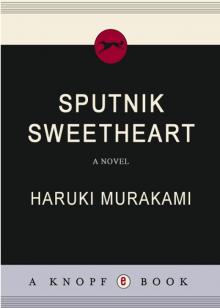 Sputnik Sweetheart
Sputnik Sweetheart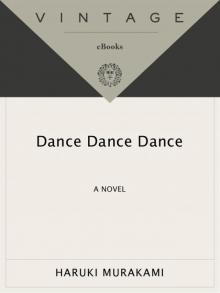 Dance Dance Dance
Dance Dance Dance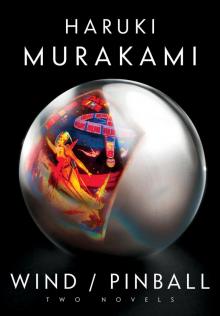 The Wind (1) and Up Bird Chronicle (2)
The Wind (1) and Up Bird Chronicle (2) Blind Willow, Sleeping Woman
Blind Willow, Sleeping Woman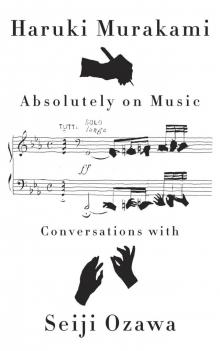 Absolutely on Music: Conversations With Seiji Ozawa
Absolutely on Music: Conversations With Seiji Ozawa Norwegian Wood
Norwegian Wood South of the Border, West of the Sun
South of the Border, West of the Sun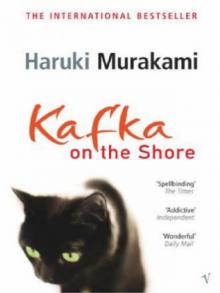 Kafka on the Shore
Kafka on the Shore Men Without Women
Men Without Women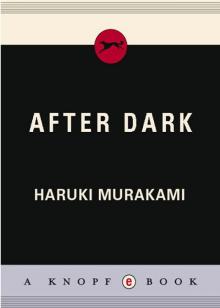 After Dark
After Dark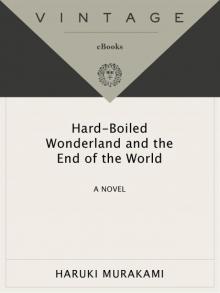 Hard-Boiled Wonderland and the End of the World
Hard-Boiled Wonderland and the End of the World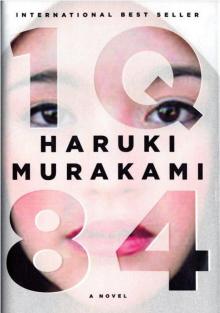 1q84
1q84 The Wind-Up Bird Chronicle
The Wind-Up Bird Chronicle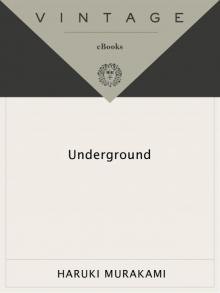 Underground: The Tokyo Gas Attack and the Japanese Psyche
Underground: The Tokyo Gas Attack and the Japanese Psyche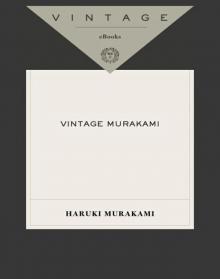 Vintage Murakami
Vintage Murakami The Elephant Vanishes: Stories
The Elephant Vanishes: Stories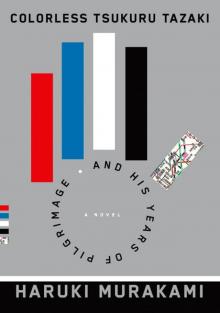 Colorless Tsukuru Tazaki and His Years of Pilgrimage
Colorless Tsukuru Tazaki and His Years of Pilgrimage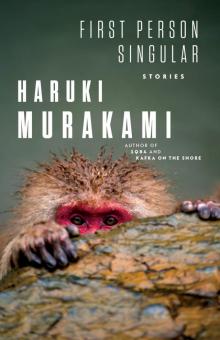 First Person Singular
First Person Singular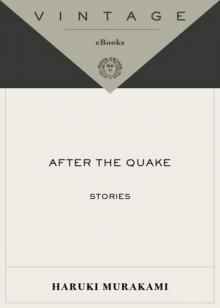 After the Quake
After the Quake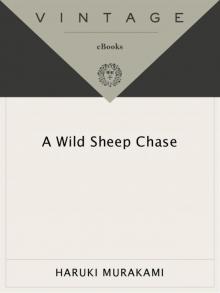 A Wild Sheep Chase
A Wild Sheep Chase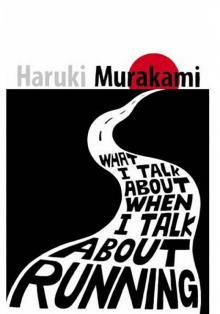 What I Talk About When I Talk About Running
What I Talk About When I Talk About Running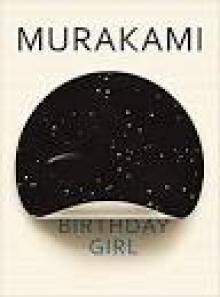 Birthday Girl
Birthday Girl The Elephant Vanishes
The Elephant Vanishes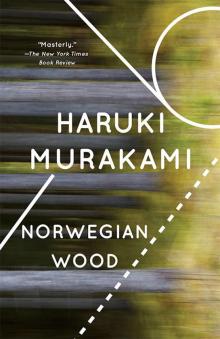 Norwegian Wood (Vintage International)
Norwegian Wood (Vintage International)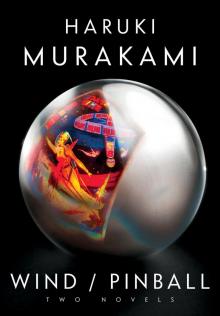 Wind/Pinball
Wind/Pinball Norwegian Wood Vol 1.
Norwegian Wood Vol 1. Underground
Underground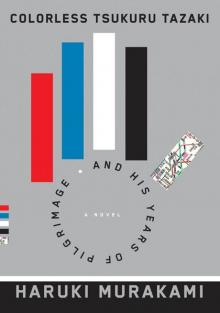 Colorless Tsukuru Tazaki and His Years of Pilgrimage: A novel
Colorless Tsukuru Tazaki and His Years of Pilgrimage: A novel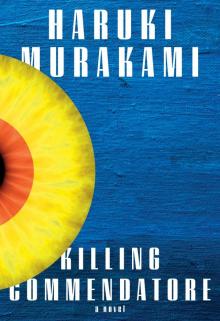 Killing Commendatore
Killing Commendatore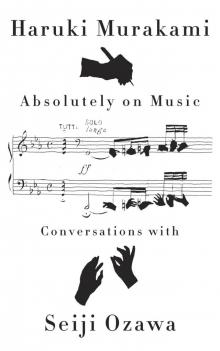 Absolutely on Music
Absolutely on Music